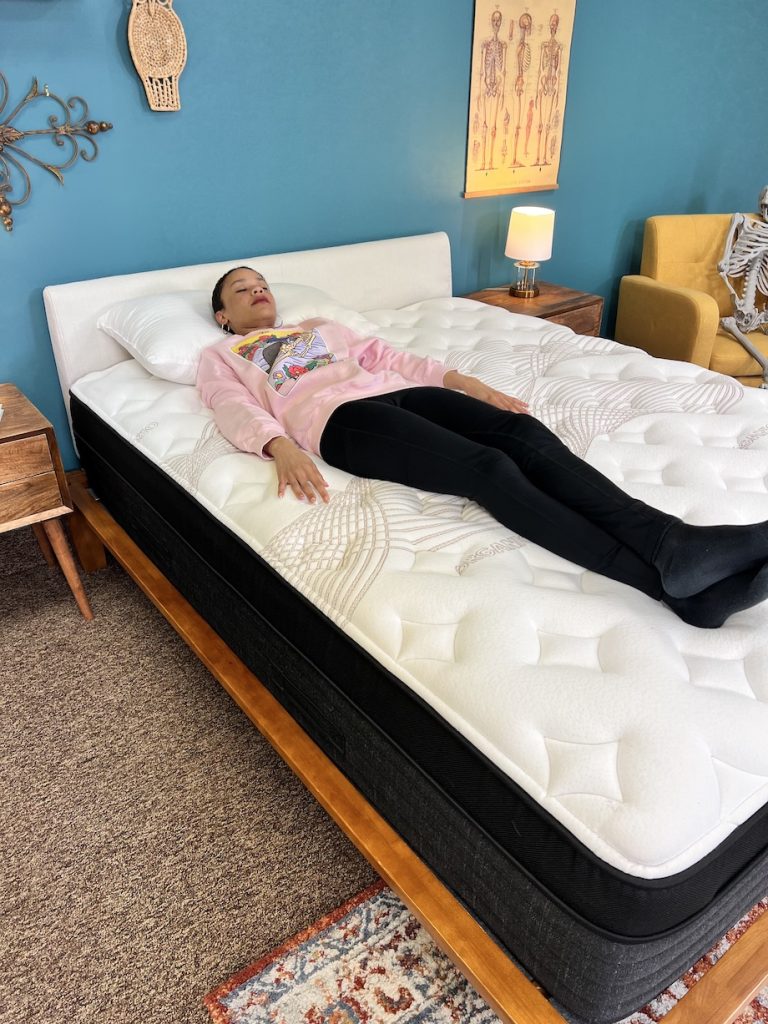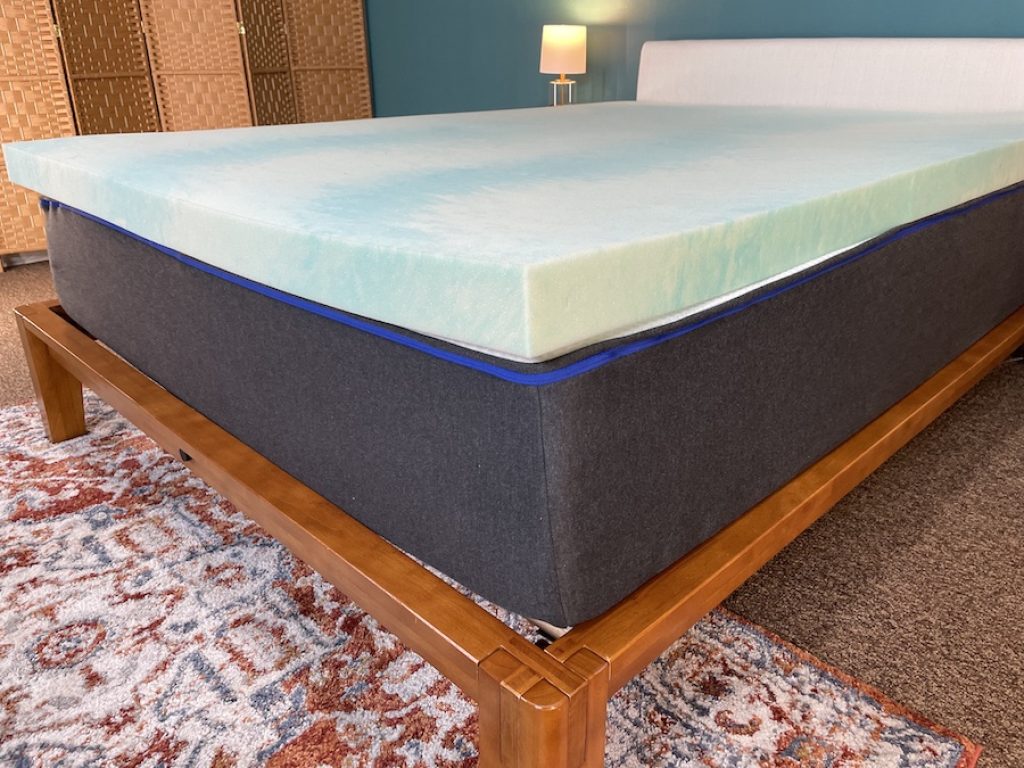Lower back pain is a common issue that can happen for a variety of reasons, such as age, muscle strains, arthritis, or a herniated disc.
Another factor that can deeply impact lower back pain is how you sleep. Here, we’ll give you some tips for sleeping with lower back pain, go over the types of lower back pain, the best sleeping positions for you, and other commonly asked questions.
Types of Lower Back Pain
There are two main types of back pain: acute and chronic. Whichever type you’re experiencing, improving how you sleep could have a big impact on your back.
Acute
Acute lower back pain is short-term, lasting somewhere between a few days and a few weeks. This type of pain is often connected to an injury or some other identifiable event. When acute back pain fades, there won’t be an ongoing effect on your mobility.
Chronic
Chronic lower back pain is pain that lasts for three months or longer and in many cases, doesn’t begin with a clear link to an injury. Interestingly, chronic lower back pain has increased by more than 100 percent1 in adults in the last decade and can be tied to factors like stress, depression, and anxiety.
If you have a condition, like a herniated disc, that might be causing long-term lower back pain, we recommend seeing a doctor to create an action plan.
What Is the Connection Between Sleep and Lower Back Pain?
Sleep and lower back pain have a cyclical connection. Of course, if you are physically uncomfortable, you can have a harder time sleeping. The worse your sleep is, though, the worse your back pain can become.
A 2020 study2 found that not only can back pain cause sleep disturbances, but sleep disturbances can lead to back pain. This is likely because, during deep sleep, one of the four sleep stages you experience, your body performs tissue growth and repair3. In short, this is when much of your physical healing happens.
Sleep deprivation impairs this healing process and can affect your mood in a way that heightens pain sensitivity. Therefore, getting better sleep is vital to breaking this cycle.
The Best Sleeping Positions for Lower Back Pain
- Back Sleeping (Best) – According to Keck Medicine of USC4, the best position for those with lower back pain is lying flat on your back. If you’ve tried this before and found it uncomfortable, try placing a pillow under your knees to prop them up and keep your spine flat on the mattress, rather than curved upward. You’ll also want to place a good, supportive medium-loft pillow beneath your head.
- Side Sleeping (Good) – If lying on your back is too difficult or uncomfortable, or if you are pregnant, sleeping on your side is a good runner-up for back pain. Try sleeping with your legs straight, rather than bent, and put a pillow between your knees. This will keep your spine neutral. Unfortunately, the most popular sleeping position – on your side with legs bent upward – is less ideal for back pain because it promotes an uneven distribution of weight that can create more back pain.4 Explore our picks for the best mattresses for side sleepers.
- Stomach Sleeping (Worst) – If you have back pain, sleeping on your stomach could make it worse. This position puts the most pressure on your lower back because you’re more likely to hyperextend your lower back if your hips sink too far into the bed. Plus, it causes you to have to turn your neck to the side, which can cause neck and upper back pain as well.4
Are you a stomach sleeper who wants to improve your sleep? View our top picks for the best mattresses for stomach sleepers.
Can a Mattress Cause Lower Back Pain?
If you have slept on a good mattress and then on a bad one, perhaps while traveling or staying at someone else’s house, you know first-hand how a mattress can impact lower back pain.
Research backs this up, too. In a study5, participants’ beds were replaced by medium-firm mattresses, specifically layered with foam and latex based on the participants’ sleeping positions. Over 12 weeks, participants rated their sleep quality, comfort, back pain, and stiffness. Progressively over the weeks, participants reported not only less and less back pain and stiffness but better quality of sleep and less discomfort during the day as well.5
Explore Our Picks:
Tips for Sleeping Better With Lower Back Pain
1. Start with the Right Mattress
A 2021 study6 shows that sleeping on a medium-firm bed, as opposed to a soft or extra-firm one, is best for people with back pain. This is because a medium-firm mattress for back pain supports proper spine alignment while you’re sleeping.
2. Get a Mattress Topper
Buying a new mattress can be a big financial commitment, and if that’s not where you’re at, you can get a mattress topper instead. A mattress topper for back pain can add extra contouring and support to your back. Toppers are designed to alter the feel of a bed but come at a fraction of the price of a new mattress.
3. Improve Your Sleep Hygiene
There is a long list of ways to improve your sleep hygiene, which is a term to describe our collective sleep health habits. However, we’ll go over some of the most critical ones.
First, be sure you are getting outside and exposing yourself to sunlight within 30 minutes to an hour of waking up to help get your natural circadian rhythms on track. Second, you’ll want to wind down and turn off your screens at least an hour before bedtime because the blue light from these devices suppresses melatonin7, a hormone that fosters sleepiness.
Third, keep your bedroom cool, quiet, and dark because these are the optimal conditions for sleeping. Lastly, avoid eating large meals before bed, especially if you’re prone to acid reflux or indigestion.
4. Change Your Sleeping Position
Keeping your spine in proper alignment while you’re sleeping is vital for navigating back pain. Proper alignment means the spine is straight with a natural curve and feels comfortable.
When people sleep on their stomachs, or even on their backs on a too-hard mattress, the alignment of the spine can get out of whack and cause a lot of low back pain.
As mentioned earlier, the best sleeping position for back pain is to lie on your back.4 For optimal spine alignment, make sure you have a supportive pillow under your head, and you can place another one under your knees to support your lower back.
If it’s difficult for you to sleep on your back, you can also try sleeping on your side with your legs straight and a pillow between your knees.
Learn More: How to Sleep On Your Back

5. Reduce Your Alcohol and Caffeine Intake
Alcohol may help you doze off initially, but it can negatively affect the quality of your sleep. According to research8, alcohol, whether consumed regularly or rarely, impacted participants’ second half of sleep during the night. Furthermore, alcoholics experienced a variety of sleep disturbances, both during drinking and abstinent periods.8
Caffeine, a stimulant, may seem like a more obvious sleep disruptor, but many people still drink caffeine well into the evening. Research9 has found that caffeine can disrupt sleep up to six hours before bed, so if you go to bed at, say, 10:00 p.m., stop drinking caffeine by 4:00 p.m. to help yourself sleep more easily.
6. Try Relaxation Methods
Before bed, you can establish a calming nighttime ritual. This might look like making some chamomile tea, journaling, meditating, taking a bubble bath, or reading a good book.
Science has found a relationship between stress and chronic pain. A 2018 study10 found that reducing stress through exercise and mindfulness-based therapies showed a significant impact on chronic pain. Meanwhile, another study11 suggests a tie between psychological stress and lower back pain.
7. Use a Heating Pad
During the day, experts advise12 alternating heat and cold for lower back pain. The cold should reduce inflammation, and the heat should improve circulation in the area. Use the heating pad for 15 to 20 minutes, then a few hours later, apply an ice pack for 10 to 15 minutes.
8. Get a Massage
If you’ve ever gotten a massage for lower back pain, you probably don’t need a study to tell you that they can help, but there is research to back it up. One study13 found that lower back pain and range of motion were improved significantly in participants who received massages. They also reported experiencing an improvement in depression, anxiety, and sleep.13
9. Take Anti-Inflammatories
Consider speaking with your healthcare provider, who can recommend some anti-inflammatory medications to help with the pain. Advil (ibuprofen)is an example of a well-known anti-inflammatory medication.
If you’d prefer an alternative to anti-inflammatory medications, try taking turmeric or including it in your food, though we strongly encourage asking your healthcare provider before incorporating any into your diet. A 2017 study14 showed that turmeric (or curcumin) may aid in the management of oxidative and inflammatory conditions, metabolic syndrome, arthritis, and even anxiety.
When Should You See a Doctor for Lower Back Pain?
Back pain is common and often goes away on its own or by making lifestyle and sleeping changes. According to the American Academy of Family Physicians15, though, you should talk to your doctor if:
-
- The pain began with an injury
-
- The pain is debilitating
-
- The pain goes down your leg below your knee
-
- Your leg, foot, groin, or rectum feel numb
-
- You have fever, chills, nausea, vomiting, stomach pain, or weakness
-
- You have trouble going to the bathroom
-
- Your pain gets worse or doesn’t improve after 2-3 weeks
Are You Sleeping With Back Pain?
Lower Back Pain FAQs
How should I sleep to relieve lower back pain?
The best position for lower back pain is on your back with one pillow behind your head and one pillow tucked behind your knees4 . If you can’t sleep well on your back, you can try sleeping on your side with your legs long and straight, with a pillow tucked between your knees. These positions should keep your spine in its best alignment to relieve lower back pain.
Is it better to sit or lie down with lower back pain?
Sitting in a chair for long periods is a major cause of lower back pain because it creates a lot of compression in the lower back. If you have lower back pain, you’ll want to avoid sitting if you can. Try lying flat on the floor with a pillow underneath your knees or with your legs long and propped up, flat against the wall.
What’s the best sleep position for lower back pain during pregnancy?
Lower back pain during pregnancy can make sleeping difficult. Try to avoid sleeping on your back when pregnant, as this can put pressure on your uterus and cut off blood flow to your baby4. Instead, sleep on your side. You can place pillows underneath your stomach and between your legs for added comfort.

Natalie Grigson
Writer
About Author
Natalie is a content writer for Sleep Advisor with a deep passion for all things health and a fascination with the mysterious activity that is sleep. Outside of writing about sleep, she is a bestselling author, improviser, and creative writing teacher based out of Austin.
Combination Sleeper
References:
- Allegri Massimo., et al. “Mechanisms of low back pain: a guide for diagnosis and therapy”. F1000Research. 2016.
- Amiri, Sohrab., Behnezhad, Sepideh. “Sleep disturbances and back pain : Systematic review and meta-analysis”. Neuropsychiatrie. 2020.
- “What Happens During Sleep?”. Eunice Kennedy Shrive National Institute of Child Health and Human Development. 2019.
- King, Heidi Tyline. “The Best — and Worst — Sleep Positions for Back Pain”. Keck Medicine of USC. 2019.
- Jacobson, Bert H., et al. “Effect of prescribed sleep surfaces on back pain and sleep quality in patients diagnosed with low back and shoulder pain”. Applied Ergonomics. 2010.
- Caggiari, Gianfilippo., et al. “What type of mattress should be chosen to avoid back pain and improve sleep quality?”. Journal of Orthopaedics and Traumatology. 2021.
- “Blue light has a dark side”. Harvard Health Publishing. 2020.
- Thakkar, Mahesh M., Sharma, Rishi., Sahota, Pradeep. “Alcohol disrupts sleep homeostasis”. Alcohol. 2015.
- Drake PhD, Christopher., et al. “Caffeine effects on sleep taken 0, 3, or 6 hours before going to bed”. Journal of Clinical Sleep Medicine. 2013.
- Wippert Pia-Maria., Wiebking, Christine. “Stress and Alterations in the Pain Matrix: A Biopsychosocial Perspective on Back Pain and Its Prevention and Treatment”. International Journal of Environmental Research and Public Health. 2018.
- Vinstrup, Jonas., Jakobsen, Markus D., Andersen, Lars L. “Perceived Stress and Low-Back Pain Among Healthcare Workers: A Multi-Center Prospective Cohort Study”. Frontiers in Public Health. 2020.
- “Use Heat or Ice to Relieve Low Back Pain”. Kaiser Permanente. Last modified July 17, 2023.
- Hernandez-Reif, M., et al. “Lower back pain is reduced and range of motion increased after massage therapy”. International Journal of Neuroscience. 2001.
- Hewlings, Susan J., Kalman, Douglas S. “Curcumin: A Review of Its Effects on Human Health”. Foods. 2017.
- “Low Back Pain.” Family Doctor. Last modified October 2023.

